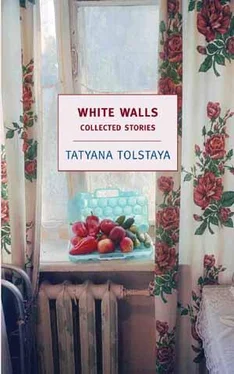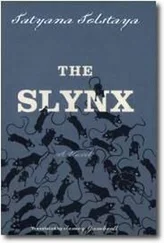“What about Vlasov the bard?” Yura recalled.
“Bite your tongue!”
With him, it was just the opposite; but the shame was terrible: they picked him up at Filin’s, too, and invited him to their house and invited lots of guests to hear him sing, spent two hours in line to get a special cake. They locked their daughter in her room and the dog in the kitchen. Vlasov the bard came, grim, with his guitar, didn’t even try the cake: cream softens the voice and he wanted his voice hoarse. He sang a couple of songs: “Aunt Motya, your shoulders, your pecs and cheeks, like Nadia Comaneci, are developed by gymnastique…” Yura made a fool of himself, showing his ignorance, loudly whispering in the middle of the song, “I forget, what part are the pecs?” Galya grew anxious, and, hand laid on heart in emotion, said he must sing “Friends”—it’s such a marvelous, marvelous song. He had sung it at Filin’s—gently, sadly—about “around the table covered with oilcloth, over a bottle of beer” sit a group of old friends, bald, all losers. Each one’s life went wrong, each has his own sorrow: “one can’t love, the other can’t rule”—and no one can help, alas!—but at least they’re together, they’re friends, they need one another, and isn’t that the most important thing in life? You listen and you feel that—yes-yes-yes—the same thing happened in your life, yes, just like it. “What a song. A hit.” Yura whispered. Vlasov the bard frowned even more, looked off into the distance—off into that imagined room where the mutually admiring baldies were uncapping a distant beer; he strummed the guitar and began sadly, “around the table covered with oilcloth…” Julie, locked in the kitchen, scratched at the floor and howled. “With a bottle of beer,” Vlasov continued. “ Woof woof woof,” the dog persisted. Someone snorted, the bard put his hand on the strings with an injured air, and took a cigarette. Yura went to deal with Julie.
“Is that autobiographical?” some idiot asked reverently.
“What? All my songs are autobiographical to a degree.”
Yura returned, the bard tossed away his butt, and concentrated. “Around the table, covered with oilcloth…” A tortured howl came from the kitchen.
“A musical dog,” the bard said viciously.
Galya dragged the resisting German shepherd to the neighbors, the bard hurriedly finished the song—the howling came through the co-op’s walls—he shortened his program, and then in the foyer as he zipped up his jacket announced with disgust that he usually charged two rubles a head but since they didn’t know how to organize a creative atmosphere, he’d settle for a ruble apiece. And Galya ran back to the neighbors—a nightmare, lend me a ten—and they, also just before payday, dug around, collecting change and shaking the kids’ piggy bank to the howls of the robbed children and the barking of overjoyed Julie.
Yes, Filin knows how to deal with people, and we sure don’t. Well, maybe next time it’ll go better.
It wasn’t quite eight yet—just enough time to stand in line for paté in the store at the bottom of the block of flats where Filin lived. There’s no trouble finding cows in our suburb, but you just try finding pàté. At three minutes to eight they got into the elevator, and Galya, as usual, looked around and said, “I could live in an elevator like this,” then the polished parquet floor of the landing, the brass plate: “I. I. Filin,” the bell; and then the man himself on the doorstep, black eyes glowing, head tilted to one side: “Punctuality is the politeness of princes…”
And it’s so pleasant hearing that, those words, as if Filin were a sultan and they truly were princes, Galya in her inexpensive coat and Yura in his jacket and knit cap.
And they floated in, the royal pair, chosen for one evening, into the warmth and light, the sweet piano trills, and proceeded to the table where the hothouse roses refuse to acknowledge the frost, wind, darkness that have besieged Filin’s impregnable tower, powerless to penetrate.
Something elusive is different in the apartment… ah, they see: the glass case with the beaded trifles has been moved, the candelabra has moved to the other wall, the arch leading to the back room is curtained, and moving that curtain aside… Alisa, the allegedly charming creature, comes out and offers her hand.
“Allochka.”
“Well, yes, she is Allochka, but we will call her Alisa, isn’t that right? Please, sit down,” said Filin. “Well, I recommend the pàté. A rarity. You know, pàtés like this…”
“I see you got it downstairs,” Yura said happily. “We go down. From the conquered heights. Even the gods descended’—isn’t that how it goes?”
Filin smiled thinly and twitched an eyebrow—to say maybe I got it downstairs and maybe I didn’t. You have to know everything, don’t you? Galya mentally kicked her husband for his tactlessness.
“Appreciate the tartlets,” Filin started anew. “I’m afraid that you are the last people to have them on this sinful earth.”
Tonight he called the pirozhki “tartlets” for some reason— probably because of Alisa.
“Why, what happened, have they stopped selling flour? On a global scale?” Yura was in good humor, rubbing his hands, his bony nose red in the heat. The tea gurgled.
“Nothing of the kind. What is flour?” Filin’s beard nodded.
“Some sugar, Galya…. What is flour? The secret is lost, my friends. The last person to know the ancient recipe is dying—I just got a call. Ninety-eight, a stroke. Try them, Alisa; may I pour you tea in my favorite cup?”
Filin’s gaze grew misty, as if hinting at the possibilities of special closeness that could result from such intimate contact with his beloved dishes. The charming Alisa smiled. What was so charming about her? Her black hair shone as if it were greased, a hook nose, mustache. Simple dress, knit, the color of a pickle. Big deal. Better women than she have sat here, and where were they now?
“And just think,” Filin was saying. “Just two days ago I ordered the tartlets from this Ignaty Kirillych. Just yesterday he baked them. Just this morning I got them, each wrapped in tissue paper. And now, a stroke. They called me from Sklifosovsky hospital.” Filin bit into a puff pastry bomb, raised his handsome brows, and sighed. “When still a lad, Ignaty worked at the Yar, and the old pastry chef Kuzma gave him the secret of these pastries on his deathbed. Just try them.” Filin wiped his beard. “And Kuzma had worked in Petersburg in his day at Wolf and Beranger—the famous pastry shop. They say that before his fatal duel, Pushkin dropped by Wolf’s and asked for tartlets. That day Kuzma was sleeping off a binge and hadn’t baked any. Well, the manager said, we don’t have any. These people are like that, Alexander Sergeyevich. Wouldn’t you like a bouchée? Or a cream horn? Pushkin got upset, waved his hat, and left. Well, you know what happened later. Kuzma overslept, and Pushkin is in his grave.”
“Oh, my god,” said Galya.
“Oh, yes. And do you know it had repercussions on everyone? Wolf shot himself. Beranger converted to Russian Orthodoxy, the manager donated thirty thousand to a religious institution, and Kuzma simply lost his mind. He kept muttering, ‘Oh, Alexander Sergeyevich…. You didn’t have my tartlets… If only you had waited a bit…’”
Filin tossed another pirozhok in his mouth and crunched. “However, that Kuzma lived to our day. He passed on the recipe to his students with shaking hands. Ignaty got the dough; someone else, the filling. Well, then came the revolution, the civil war. The one who knew the filling joined the Social Revolutionaries. Ignaty lost track of him. A few years later— Ignaty was still with the restaurant—something prompted him, he came out of the kitchen, and there at a table is that man with a lady. He’s got a monocle, a mustache—unrecognizable. Ignaty runs over to him as is, covered with flour. ‘Come with me, comrade.’ The man had no choice. White as a sheet, into the kitchen he went. ‘Bastard, tell me the meat filling.’ What could he do, his past could cause him trouble. He told. ‘Tell me the cabbage filling.’ He trembled, but he did it. And now the fish.’ That was absolutely top secret. He said nothing. Ignaty: ‘The fish!’ And he picked up his rolling pin. The man said nothing. Then suddenly he screamed and ran out. They chased him, tied him up, and looked at him—he’d lost his mind, he was rolling his eyes and foaming at the mouth. So the fish remained a secret. Yes… That Ignaty Kirillych was an interesting old man, so fastidious. How he felt puff pastry, what a feel for it!… He baked at home. He’d draw the curtains, double lock the door. I would say, ‘Ignaty Kirillych, dear man, share your secret, what’s it to you?’ but he wouldn’t budge. He kept waiting for a worthy recipient. And now the stroke… Try one.”
Читать дальше












